Septuagint Commentary Series | SCS (13 vols.)
Digital Logos Edition
Overview
This multi-volume series fills a significant gap in biblical studies by providing a literary commentary on the Greek text of the Septuagint. The Septuagint is widely recognized as one of the most important interpretations of the Old Testament and one of the most important sources for New Testament study. Whereas there has been much attention and many commentary series devoted to the two testaments, the Septuagint has been virtually neglected as a set of primary texts used by Jewish and Christian religious communities in the Greco-Roman world.
Each volume follows a format well known in Greek-text commentaries, including an introduction to the textual history of the biblical book and consideration of other historical, theological, and related topics. The commentary proper contains the Greek text based upon a single Greek manuscript, a translation of the text, and a section-by-section commentary. This series discusses individual books of the Septuagint in their own right, without extended reference to the Hebrew text.

- Contains a detailed introduction to the text
- Focuses on the Greek text of each book
- Benefits scholars of both New and Old Testament study
The volumes of this new series should be in all research libraries.
—International Review of Biblical Studies, Volume 52
- Title: Septuagint Commentary Series
- Editors: Stanley E. Porter, Richard Hess and John Jarick
- Series: Septuagint Commentary Series
- Publisher: Brill
- Volumes: 13
- Pages: 4,256
- Christian Group: Evangelical
- Resource Type: Commentaries
- Topic: Septuagint
Individual Titles
- 1 Esdras by Michael F. Bird
- 3 Maccabees by N. Clayton Croy
- 4 Maccabees by David deSilva
- Amos by W. Edward Glenny
- Baruch and the Epistle of Jeremiah by Sean A. Adams
- Exodus by Daniel M. Gurtner
- Ezekiel by John W. Olley
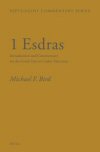
In 1 Edras Michael Bird presents a commentary on this much neglected text based on its witness in Codex Vaticanus as part of the next installment of the Septuagint Commentary Series. Containing material that parallels 2 Chronicles, Ezra, and Nehemiah, 1 Esdras is featured in the Septuagint and Christian Apocrypha. The commentary presents a survey of critical issues related to the study of 1 Esdras and provides an impressive literary analysis of the contours of 1 Esdras.
This is an important addition to the Septuagint Commentary Series, and makes a valuable contribution to scholarship on I Esdras. All three sections of the volume are helpful in generating a deeper understanding of the text, and for the appreciation of the textual and exegetical issues that surround it. This is strong piece of scholarship.
—Paul Foster, professor, University of Edinburgh School of Divinity
Michael F. Bird is Lecturer in Theology and New Testament at Crossway College. He has authored several books on New Testament and Christian Origins including Are You the One Who is to Come? and Crossing Over Sea and Land.
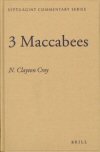
3 Maccabees is among the most neglected books of the Old Testament Apocrypha. This new commentary is one of very few written in the last century, and it is the only full-scale commentary in English. The volume includes a fresh translation of the Greek text of Alexandrinus, an introduction, a section-by-section commentary replete with cross-references to ancient literature and citations of modern scholarship, a bibliography, and indexes. A novel contribution of the commentary is an interpretation of 3 Maccabees as, in part, a narrative satire on the cult of Dionysus.
...Croy’s work bridges a half–century gap in research and bibliography on 3 Macc[abees] and is friendly to the reader.
—Uriel Rappaport, Jewish Quarterly Review
N. Clayton Croy is Associate Professor of New Testament at Trinity Lutheran Seminary. He is the author of A Primer of Biblical Greek and The Mutilation of Mark’s Gospel.
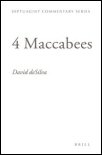
This commentary examines 4 Maccabees as a contribution to the ongoing reformulation of Jewish identity and practice in the Greek-speaking Diaspora. It analyzes the Jewish author’s interaction with, and facility in, Greek rhetorical conventions, ethical philosophy, and literary culture, giving attention also to his use and interpretation of texts and traditions from the Jewish Scriptures and other Hellenistic Jewish writings. The commentary exhibits the author’s skillful weaving together of all these resources to create a text that interprets the Torah-observant life as the fullest embodiment of the best Greek ethical ideals. A distinctive feature is the examination of how the experience of reading 4 Maccabees in Codex Sinaiticus differs from the experience of reading the eclectic text.
...d.S.’s new commentary represents a welcome contribution to research on 4 Maccabees.
—Robert J.V. Hiebert, Catholic Biblical Quarterly
David A. deSilva is Trustees’ Professor of New Testament and Greek at Ashland Theological Seminary. His recent publications include An Introduction to the New Testament, Introducing the Apocrypha, and Perseverance in Gratitude.
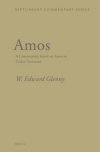
In this commentary W. Edward Glenny provides a careful analysis of the Greek text and literary features of Amos based on its witness in the fourth century codex Vaticanus. The commentary begins with an introduction to Amos in Vaticanus, and it contains an uncorrected copy of Amos from Vaticanus with textual notes and a literal translation of that text. In keeping with the purpose of Brill’s Septuagint Commentary Series Glenny seeks to interpret the Greek text of Amos as an artifact in its own right to determine how early Greek readers who were unfamiliar with the Hebrew would have understood it.
W. Edward Glenny is professor of New Testament and Greek at University of Northwestern in St. Paul, Minnesota. He is the author of 1 Peter in the Evangelical Exegetical Commentary (EEC) (44 vols.).
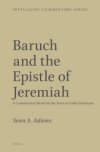
This work is the first major commentary of LXX Baruch and the Epistle of Jeremiah in English. Rather than seeing LXX mainly as a text-critical resource or as a window on a now-lost Hebrew text, this commentary, as part of the Septuagint Commentary Series, interprets Baruch and the Epistle of Jeremiah as Greek texts and from the perspective of Greek readers unfamiliar with Hebrew. Included are a transcription and an English translation of Codex Vaticanus, the oldest extant manuscript of the books, and a detailed commentary. Another major contribution is the utilization of the sense-delimitation (paragraphs) of Codex Vaticanus and other codexes to explore how early readers interpreted the text.
Sean A. Adams is a British Academy Post—doctoral Fellow at the University of Edinburgh and the author of The Genre of Acts and Collected Biography, and Issues in Luke-Acts: Selected Essays in the Gorgias Biblical Studies Collection (29 vols.).
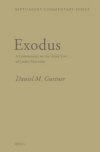
Exodus: A Commentary on the Greek text of Codex Vaticanus is the first comprehensive commentary on the Septuagint in English. An introduction orients readers to the study of LXX Exodus and the manuscript of Codex Vaticanus. This is followed by a presentation of the text of Vaticanus opposite a fresh translation. In the commentary proper, Gurtner examines literary features of the Greek of Exodus in general as well as features particular to the text of Vaticanus. Some comparisons are made with other Greek traditions of Exodus in addition to translational features of Exodus with respect to its Vorlage.
Daniel M. Gurtner is associate professor of New Testament at Bethel Seminary. He is editor of several works on the New Testament and Second Temple Judaism, including This World and the World to Come: Soteriology in Early Judaism, Built Upon the Rock: Studies in the Gospel of Matthew, and Jesus, Matthew’s Gospel and Early Christianity: Studies in Memory of Graham N. Stanton.
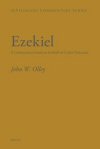
This work is the first major commentary to focus on the text of LXX Ezekiel in any modern language. Rather than seeing LXX mainly as a text-critical resource with variants to be explained, this commentary, as part of the Septuagint Commentary Series, examines a specific manuscript in its own right as a document used by Greek readers unfamiliar with Hebrew. Included are a transcription and English translation of Codex Vaticanus, the oldest extant manuscript of the whole book, and a detailed commentary that also compares the earlier P967 and the Masoretic Text where they differ. Another major new contribution is the utilization of the sense-delimitation (paragraphs) of Codex Vaticanus itself, exploring how this influences reading of the text.
It is a thrill to see a senior Australian biblical scholar (Perth based) making such a valuable contribution to this important and prestigious commentary series and the editors of the series (Stanley E. Porter, Richard S. Hess and John Jarick) are also to be commended for the monumental task they have taken on.
—Greg Goswell, lecturer in biblical studies, Presbyterian Theological College, Melbourne, Australia
John W. Olley is Research Associate, Vose Seminary, Perth, Australia, and formerly concurrently Senior Lecturer in Old Testament Studies, Murdoch University. He has published widely in Septuagintal and other Old Testament areas, including ‘Righteousness’ in the Septuagint of Isaiah.
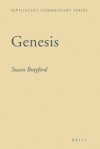
The Septuagint (LXX) of Genesis allowed Greek-speaking Jews in the last centuries BCE to read their sacred stories in their new lingua franca. The Hellenistic influence on this Greek translation of Genesis at times subtly altered the manner in which Jews– and later Christians– understood the origins of the world and the relationships within and outside the first family of Israel. Because the LXX was the Bible of the early Christian Church, it had more influence on Christian thought than the earlier Hebrew version. LXX Genesis: A Commentary, based on the Greek text of Codex Alexandrinus, offers the first English language commentary on one of the most significant books of Tanak and the Christian Bible.
... highly recommended for the advanced student and the non–specialist researcher.
—A.G. Salvesen, Journal for the Study of the Old Testament
Susan A. Brayford is currently associate professor of religious studies and associate dean of Centenary College.
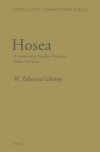
Rather than studying the LXX of Hosea mainly as a text-critical resource for the Hebrew or as a help for interpreting the Hebrew, this commentary, as part of the Septuagint Commentary Series, primarily examines the Greek text of Hosea as an artifact in its own right to seek to determine how it would have been understood by early Greek readers who were unfamiliar with the Hebrew. This commentary is based on the uncorrected text of Vaticanus, and it contains a copy of that text with notes discussing readings that differ from modern editions of the LXX along with a literal translation of that text. This commentary also has an introduction to the Minor Prophets in the Septuagint. It is relevant for anyone studying the LXX or the book of Hosea.
Within the constraints of the series, this thorough and detailed commentary provides enlightening historical background, explains unusual syntax, and provides valuable insights on contextualization for the original Greek audience.
—Karen H. Jobes, Bulletin for Biblical Research
W. Edward Glenny is professor of New Testament and Greek at University of Northwestern in St. Paul, Minnesota. He is the author of 1 Peter in the Evangelical Exegetical Commentary (EEC) (44 vols.).
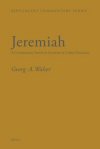
This commentary on Greek Jeremiah is based on what is most certainly the best complete manuscript, namely Codex Vaticanus. It presents the uncorrected original text and utilizes the paragraphs of the manuscript itself. The translation into English on facing pages is deliberately literal so as to give the modern reader a hint of the impression the Greek translation could have made on an ancient reader. The purpose of the commentary is to provide a discussion of the Greek text of Jeremiah in its own right. Hence references to the Vorlage are only made to explain peculiarities in the Greek text.
Georg A. Walser is assistant senior lecturer in Greek at Lutheran School of Theology, Gothenburg.
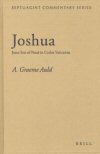
Codex Vaticanus (fourth century CE) includes the oldest, and probably the most important, complete copy of the Greek translation of the biblical book of Joshua (or Jesus, in Greek). The translation had been made in the second century BCE from a Hebrew version of Joshua which differed at many points from the Hebrew text now familiar to us. It was mostly rather literal; and, where it appears surprisingly free, it is often inviting attention to relevant passages in the books of Moses. What the first scribe of the Codex wrote is transcribed uncorrected. The deliberately literal rendering into English on facing pages provides ready access to alternative forms of the many proper names in Joshua. The commentary discusses both translation and exegetical technique.
A. Graeme Auld is professor of Hebrew Bible in the University of Edinburgh. Recent publications include Joshua Retold in the Old Testament Studies Series Collection (8 vols.), The Old Testament Library Series: I & II Samuel, and The Dead Sea Scrolls in their Historical Context.
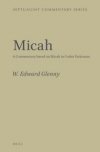
In this commentary W. Edward Glenny provides a careful analysis of the Greek text and literary features of Micah based on its witness in the fourth century codex Vaticanus. The commentary begins with an introduction to Micah in Vaticanus, and it contains an uncorrected copy of Micah from Vaticanus with textual notes and a literal translation of that text. In keeping with the purpose of Brill’s Septuagint Commentary Series Glenny seeks to interpret the Greek text of Micah as an artifact in its own right in order to determine how early Greek readers who were unfamiliar with the Hebrew would have understood it.
W. Edward Glenny is professor of New Testament and Greek at University of Northwestern in St. Paul, Minnesota. He is the author of 1 Peter in the Evangelical Exegetical Commentary (EEC) (44 vols.).
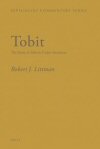
Tobit is one of the Apocrypha, a collection of books rejected from their canon by the Jews but accepted by some of the Christian church fathers. Ever since the 4th century CE, commentaries have been written on Tobit. The original Hebrew and Aramaic versions of Tobit were lost, until fragments were discovered as part of the Dead Sea Scrolls in 1947. The present work is the first Greek text and commentary of Tobit to be published since the publication of the Hebrew and Aramaic fragments. This edition contains the text from two fourth century CE manuscripts, the Codex Sinaiticus (long version) and Codex Vaticanus (short version) as well as a translation into English and a commentary.
Overall, this work is a useful contribution to Tobit research, though doubtless not the last word.
—Jeremy Corley, Journal of Theological Studies
Robert J. Littman is professor of classics, University of Hawaii at Manoa. He has published extensively in Greek history and literature, and biblical studies, including The Greek Experiment.
About the Editors
Stanley E. Porter is a respected expert in Greek and New Testament studies, and is actively involved in OpenText.org and the Linguistics Institute of Ancient and Biblical Greek. Porter currently serves as president, dean, and professor of New Testament at McMaster Divinity College. He is the author or editor of numerous studies in the New Testament and Greek language, including Idioms of the Greek New Testament, 2nd ed., Discourse Analysis and the New Testament: Approaches and Results, and Dictionary of New Testament Background.
Richard Hess is professor of Old Testament and Semitic languages at Denver Seminary. He is the editor of the Denver Journal, Denver Seminary’s online theological review, and The Bulletin for Biblical Research. He is also the founder and editor of the Bulletin’s Supplement Series and is a member of a dozen scholarly societies and has worked on several Bible translations. In addition to several hundred book reviews and dictionary articles, Dr. Hess has published more than 100 scholarly articles in journals such as Biblica, Biblical Archaeologist, The Bulletin for Biblical Research, Catholic Biblical Quarterly, and Themelios.
John Jarick assisted as a co–editor for the Septuagint Commentary set.
Reviews
1 rating
Meshaal
2/25/2017

Alex Cheung
7/22/2015
for much better preview, try google books. They show you dozens of pages which enable you to really sample the book.
Larry Craig
7/22/2015
I could be very interested in this set, even with the price. But the sample pages show almost nothing that everybody already has, the Greek text and an English translation. I have said before that whoever chooses sample pages isn't looking to see what pages they actually selected. They often give no idea of what the book is about, like when you have a commentary and only have sample pages of the introduction.